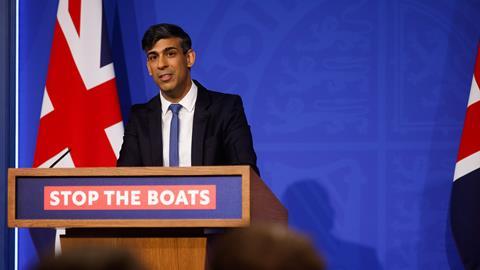Courtrooms and judges will be primed to deal with appeals once the Rwanda bill becomes law, prime minister Rishi Sunak has said. The prime minister declared ‘no more delay’ at a press conference this morning as parliament prepares to vote on the controversial legislation.
Sunak said parliament would vote on the bill tonight ‘no matter how late it goes’ and insisted flights are going to Rwanda. ‘Starting from the moment the bill passes,’ Sunak said, ‘we will begin the process of removing those identified for the first flight. We have prepared for this moment,’ the prime minister said.
To detain people while the government prepares to remove them, Sunak said detention spaces have been increased to 2,200. To process claims quickly, 200 trained caseworkers were ‘ready and waiting’.
Sunak added: ‘To deal with any legal cases quickly and decisively, the judiciary have made available 25 courtrooms and identified 150 judges who could provide over 5,000 sitting days.’
During questions, Sunak said he expected the first flight to leave within 10 to 12 weeks.
The Gazette has asked the Ministry of Justice if the Treasury is providing extra money to fund the court and judicial resources mentioned by Sunak this morning. The judiciary has been asked if the government has committed additional cash and the process for identifying the 150 judges who will be able to hear appeals.
When it was reported in January that Sunak planned to draft 150 judges to fast-track Rwanda appeals, the Judicial Office told the Gazette that judicial deployment was the responsibility of the lady chief justice and senior president of tribunals as set out in the Constitutional Reform Act. The Illegal Migration Act allowed the senior tribunals president to ask first-tier tribunal judges to sit in the upper tribunal and the president has identified judges who can be asked if needed.
Later that day, lady chief justice Baroness Carr of Walton-on-the-Hill told the justice committee: 'Parliament has legislated, we the judiciary have acted in preparation for that legislation but, to be absolutely clear, matters of deployment of judges, the allocation of work for judges, and the use of courtrooms is exclusively a matter for the judiciary, and more specifically a matter for myself and the senior president of the tribunals and it's really important, chair, that people understand that clear division.'
Update (Monday afternoon): In a statement to the Gazette, a spokesperson for the judiciary said: 'The deployment of judges is a matter for the judiciary. In line with new provisions in the Illegal Migration Act, the judiciary have identified a number of First Tier Tribunal judges who may be asked to sit in the Upper Tribunal to deal with any increase in appeals that arise from the act.
'The decision to do so will be taken by the Senior President of Tribunals when the provisions in the act commence, taking into account the interests of justice and the need for all matters before the tribunals to be handled quickly and efficiently.'
The Judicial Office said it was central to the rule of law that decisions on deployment 'remain for the independent judiciary. These matters should not be drawn into the political arena'.
This article is now closed for comment.




























30 Readers' comments